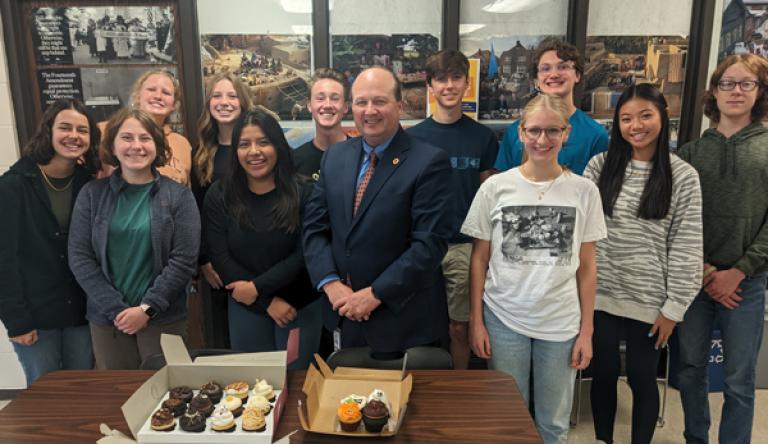To prepare and inspire

How an OLPD program develops the very best PK-12 educational leaders.
When the Minnesota Association of School Administrators selects its annual Superintendent of the Year, it’s a good bet that the honoree has some connection to the PK-12 Administrative Licensure Certificate program in the Department of Organizational Leadership, Policy, and Development (OLPD). In the last four years alone, each winner was either a graduate or an instructor of the program. “
That’s quite a record when you consider the entire state of Minnesota,” says Program Director Gary Prest, who himself was superintendent of the year in 2006, representing the Bloomington School District.
Prest has been director of the licensure program since 2014, but the program itself has been around for half a century in some form or another. “It had a variety of different monikers over the years, but all with the same purpose: inspiring leaders to lead district educational organizations at the national, state, and local levels,” Prest says.
Besides preparing aspiring school and district leaders for a superintendent license, the program also prepares educators for K-12 principals, directors of special education, and directors of community education licenses. There are 13 universities in the state that have licensure programs approved by the Minnesota Board of School Administrators. “The University of Minnesota is one of only four institutions in the state that offers programs for all four licenses,” Prest says.
The program is unique in its access to cutting-edge research as well as to the researchers themselves. “We have the ability to harness and apply multiple resources from the U of M, which offers, through CEHD and OLPD, an array of top-flight resources to support graduate-level instruction, facilities, and collaborative efforts with the Education Policy and Leadership program, of which this licensure program is a part,” says Program Coordinator and Lecturer Chris Sonenblum.
Many students enrolled in the program are practicing teachers, and most complete it in one or two years. “The program is cost effective because it doesn’t require students to procure a particular degree, and allows them to seek a certificate for 23 credits,” Sonenblum says. “Students may also apply coursework from the licensing program to another advanced degree later on if they choose to do so, but it doesn’t obligate them to add additional credits beyond state requirements for licensure.”
Prest says licensing is a recent phenomenon. When the program started, a person would receive training for a master’s degree or a doctorate. “They were an entrée to the role of an administrator,” he says. “Back around the 80s or 90s, the degree became the entrée to the license.”
Besides the course credits, licensing depends on other criteria. To be licensed as a principal, for example, a person needs a minimum of three years of teaching experience. Another requirement required by the state of Minnesota is a 320-hour administrative internship. “We put in considerable rigor, so the internship provides the opportunity to meet the required administrative competencies in real-world settings,” Prest says. “They are required to complete a series of projects that benefit the school. That is a unique feature of our program. Not all programs have that same kind of standard.”
Faculty from the field
As for courses, the program emphasizes instruction by adjunct faculty members who are currently working in or have very recently been in school administrator roles, such as Matt Hillmann, the superintendent of schools in Northfield. He has 30 years of public school experience as a teacher, coach, principal, and district-level leader in nearly every aspect of school administration. He is also the 2023 Minnesota Superintendent of the Year and was one of four finalists for National Superintendent of the Year.
Hillmann’s focus is on leadership. He has taught the program’s Leaders of Human Resources Administration course and will begin teaching the Leaders in Superintendency and Central Office course this summer. “In the past, I have also taught courses in school finance and education technology,” he says. “I’ve been lucky to have worked in leadership roles at the building and district levels, so I am comfortable teaching most educational leadership courses. I want people to learn new leadership skills to help them be effective school administrators. I want them to understand that effective school districts prioritize relationships and systems.”

Having taught for many years, Hillmann has noticed many significant changes in the field, such as communication. More specifically, its velocity nowadays. “The speed of communication has impacted school leadership,” he says. “In my view, judgment is the most critical administrative competency,” he says. “We used to have the gift of time—we could ‘sleep on’ a decision or have the space to create strategic communications about an issue. Communication is instantaneous. Text messaging and social media can spread information about school issues before leaders learn about them. We must have excellent judgment with far less time to make those judgments.”
Sonenblum says having adjunct faculty in the field such as Hillmann is a strength that sets the program apart from others because it builds networks. “They are people students can go back to,” she says. “They know they can come back and connect with faculty as well as student colleagues they worked with. It’s a very vital and living network for support and connection that continues after they leave the program.”
Creating connections
David Law, the superintendent of Minnetonka Public Schools, says the program is the perfect combination of high-quality learning and relationships. “The professors were practitioners, experts, and great teachers,” he says. “Several of my U of M professors stayed in contact with me for the past 25 years. I recently received recognition for something professional and was surprised to see them in attendance.”
Law, the Superintendent of the Year for 2020, served as an adjunct instructor at the U of M for more than a decade. Through connections he made at the U, he was hired in White Bear Lake, first as a principal and then assistant superintendent. He then moved into the superintendency in Anoka-Hennepin prior to his current position. “The U provides high-quality education and networking that have served me incredibly well,” he says about the program. “I took away the belief that we are constantly evolving and improving in our professional life and in public education. The reflection opportunities embedded in the program still play a role in my professional life.”

Ty Thompson, assistant superintendent of North St. Paul, Oakdale, and Maplewood Schools, was serving as a fourth-grade dual immersion teacher in an elementary school before she started the program. “A mentor spoke to me about considering leadership,” she says. “Since completing the licensure, I have also earned a master’s degree and my superintendent’s license through the University of Minnesota. Professionally, over the past 10 years, I have transitioned from teacher, to MTSS [Multi-Tiered System of Supports] coach, administrative intern, assistant principal, principal, and assistant superintendent.”
Thompson adds that she did not expect to meet so many lifelong friends and colleagues in the program. That sentiment is becoming a common thread, echoed by Sarah Godfrey, director of special education for Columbia Heights Public Schools. “The program has helped me create connections across districts and I still stay in touch with people I met in my classes,” she says. “It’s been fun seeing people I met as teachers become administrators.” Godfrey completed her director of special education, K-12 principal, and superintendent licensure all at the U of M. “The best part was having instructors that had been in the role that I was trying to move into as a leader,” she says. “The three internships I completed across licensure areas were invaluable and helped me grow as a leader. They provided me with the experiences I needed to be prepared for the job I have today.”
Renee Corneille, the superintendent of St. Anthony–New Brighton Public Schools, says she recommends the program for teachers considering an administrative license. “Because the U of M is a research university, having access to seminal work in the area of educational policy and administration cannot be found in other places,” she says. “I find that people who select the U of M for their administrative license want to transform education. They are not interested in the status quo. They are going to this research institution to learn deeply to execute change that will impact our students, and ultimately our nation.”
Learn more about the PK-12 Administrative licensure certificate.
From teacher to commissioner
Willie Jett has filled just about every educational role you can think of. He taught high school in the Anoka Hennepin, Osseo, and Minneapolis school districts. He was an assistant principal at Park Center Senior High School and a principal at Hopkins High School. He served districtwide as an assistant superintendent for St. Paul Public Schools and as a superintendent for St. Cloud Area Schools.
In each successive role, Jett served a greater number of students. Now, in his current position as Minnesota Commissioner of Education, he has more than 2,200 educational facilities and upwards of 880,000 students in his purview. “I am grateful to have worked in so many roles during my time as an educator, because each taught me something new and prepared me for the role I’m currently in,” he says.
Throughout his varied roles, Jett says his focus has always been on protecting a child’s spirit and ensuring access and opportunity for students. It was this focus, a desire to make an impact on more students as well as staff, that initially led him to the PK-12 Administrative Licensure program at CEHD. “I knew I could do this through a role as an administrator,” he says. “I chose the U of M because of the top-tier education, reputation for excellence, and the ongoing mentorship provided through the program.” Jett enrolled in the program twice, earning his principal’s license in 2001 and a superintendent’s license in 2011. He came back to the program a third time in June of last year, but this time on the other side. He joined the teaching faculty as a program coordinator and lecturer. “I believe in giving back to those who’ve supported me in my journey, like the U of M,” he says.
Jett says his goal was to assist young leaders on their path to self-discovery and to support the development of well-rounded, grounded administrators who care about supporting all students. “I am committed to mentoring and supporting young leaders, particularly those who have a passion for educating underserved youth,” he says.
In coming back to the program, Jett was encouraged by seeing a wider diversity in students, whether location, gender, race, or perspective. “The caliber of students I worked with greatly encourages me when I think about the future of our schools,” he says. One thing that remained constant, however, was that the program’s commitment to preparing excellent administrators remained as strong as ever. “I am confident that the program will continue to serve students and schools well,” he says.
Jett’s tenure at CEHD turned out to be short-lived, because it was only six months later—December 2022—that Gov. Tim Walz tapped him for his new role as Commissioner of Education, and the opportunity to serve on a greater scale. “Although he was with us just a short time,” said Dean Michael C. Rodriguez upon Jett’s departure, “I am excited to know his leadership expertise is being leveraged for a greater purpose in Minnesota.”
In early April, aspiring teachers from the Department of Curriculum and Instruction sat down for a discussion with Commissioner Jett.
-KEVIN MOE